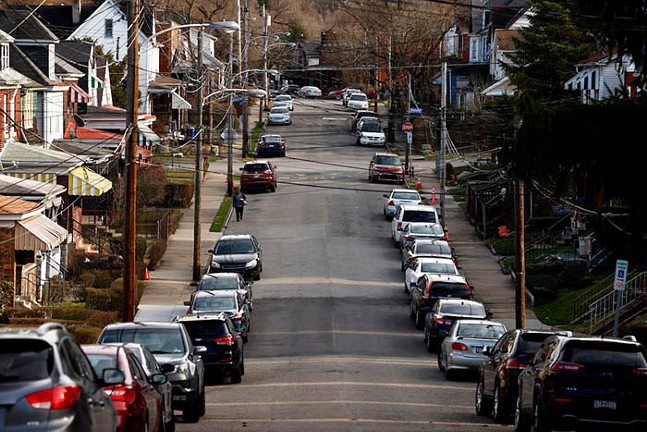Joy Katz made an unfortunate discovery shortly after she and her family moved to Highland Park eight years ago, when her first walk around the Highland Park reservoir was disrupted by the sound of rapid gunfire.
“I panicked and looked around, and then I asked someone if they had heard it, too, and that's when they said, ‘Oh, it's from the police firing range over the hill,’” she tells Pittsburgh City Paper.
Katz thus learned that her picturesque neighborhood is directly adjacent to an open-air firing range in the woods on the eastern side of Washington Boulevard belonging to the Pittsburgh Police Academy.
Since the 1980s, Highland Park residents have complained of consistent disruption from volleys of gunfire, which were once described by neighborhood resident and then-city council member Jim Ferlo as “a mini-Civil War every day and night.”
Over the years, the issue has, at times, rallied residents into concerted resistance efforts.
“Residents complain that they cannot enjoy their yard or keep their windows open,” reads a joint statement from two Highland Park community groups published in 2021. “People with PTSD have reported being retraumatized, including one family that has had to spend several nights at a hotel to escape the noise; other families have sold their homes and moved. Park users report that they, their children, and their pets are unnerved by the noise.”
Now, Katz is circulating a petition to close the firing range, which she says is a threat to public health. The petition garnered at least 500 signatures in its first two weeks in circulation.
“They’re shooting there all the time,” Katz tells City Paper, noting that residents of Highland Park and the surrounding neighborhoods are “potentially subject to rounds and rounds of gunfire at any time, [that] can last all day long … but also sometimes the gunfire happens at night.”
Katz says she has called the police departments of every U.S. city of 300,000 residents or more to inquire about the location of their firing ranges. She found that Pittsburgh boasts one of the only outdoor police firing ranges directly adjacent to a densely populated residential area.
Highland Park residents have been asking the city to take concrete steps to suppress the noise of the firing range since 1989. The most they’ve been able to achieve, however, are temporary agreements to limit the use of the range to certain days and hours.
“Scheduling is the only place where they ever yielded at all,” says long-time Highland Park resident David Klahr.
Past agreements to limit shooting to specific times have since been discarded, and Katz and Klahr say the current arrangement is that the police notify the community of their scheduled use of the range. Katz says those schedules often change with little or no notice and that simply notifying residents in advance of the gunfire is an insufficient solution.
“We object to the idea that posting the schedule somehow makes living with the sound of gunfire okay,” Katz says.
The problem has only gotten more urgent with time, Katz says.
“The effect of it is kind of cumulative. After you hear it day after day, year after year, instead of becoming less of a problem, it has a sort of cumulative stress effect. … A lot of us work from home, and we have a lot of seniors in the neighborhood. A lot of people are just home all the time.”
Highland Park is also home to several specific groups of people whose circumstances make them especially vulnerable to the disruptions caused by gunfire, Katz says, including recently resettled refugees from Afghanistan, combat veterans, and people with PTSD, including survivors of the 2018 mass shooting in the Tree of Life building. They claim an autistic child in the neighborhood has seizures that are triggered by the gunfire.
“It’s affecting people’s mental and physical health,” Katz says.
Beyond the impact of the noise, Katz is also concerned about the effects of heavy metals such as lead that are released when a firearm is discharged.
“That’s 40 years of casings, metals, all kinds of debris accumulating … Who's keeping track of that? What happens to it? Is it cleaned up? Because it could just be sitting up there seeping into our water.”
Although residents are calling the constant gunfire a public health issue, the Allegheny County Department of Health tells City Paper this issue is outside of their purview.
The Department of Public Safety referred questions on this matter to Mayor Ed Gainey’s office.
Maria Montaño, Gainey’s press secretary, tells City Paper that the shooting range represents an enduring point of conflict that may take time to resolve.
“We have been looking into a variety of ideas on how to help alleviate the concerns while trying to find ways to address this deeply complex problem that has existed for decades,” Montano wrote in an email. “Councilwoman [Deb] Gross has asked us to address this issue, along with a variety of other projects in the Highland Park neighborhood, directly with her constituents at an upcoming community meeting, and we look forward to further discussion at that time.”
Decades of unsuccessful attempts to restore tranquility to the neighborhood have left some residents resigned to the noise.
“When I was 30 years younger, I used to joke that when I get really old, I won’t hear it anymore because I’ll probably be deaf like my parents,” Klahr says, “and that’s exactly what happened. I wear hearing aids now, so when I hear the firing range, I just turn them off. I kind of aged out of being a victim.”



